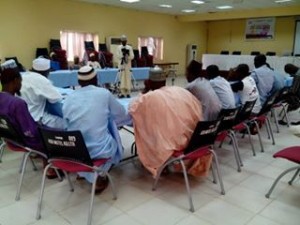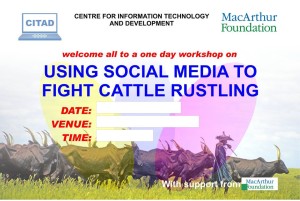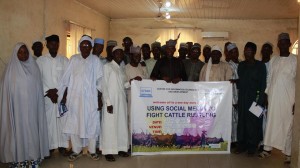REPORT ON THE WORKSHOP ON USING SOCIAL MEDIA TO FIGHT CATTLE RUSTLING HELD IN KADUNA STATE
By Sufyan Lawal Kabo
Introduction
About 23 members of the Kaduna state chapter of the Fulbe umbrella body organization Miyetti Allah, participated in the workshop on Using Social Media to Fight Cattle rustling. The participants were drawn from some rearing areas of Kaduna state namely Chikuri, Buruku, Brnin Gwari, Kagarko, Kachia and Chukum. Â These are areas where cattle rustling enigma worsened. Held on 28th June 2015 at Aso Motel along Muhammadu Buhari Way Kaduna, the workshop was organized by Centre for Information Technology and Development (CITAD) with support from MacArthur Foundation.
The objectives of the workshop:
- To sensitize participants to the use of social media in reporting and tracking cattle rustling
- To initiate a network of  volunteers for tracking and rescuing rustled cattle
- To brief the participants on the Cattle Rustling Information System (CaTRIS) that CITAD is developing to document, track and help to rescue cattle from rustlers.
The workshop
During the workshop, the participants were taken into a background presentation on the case study which is Cattle rustling and the consequences they come with which includes loss of lives, conflicts, increase in spade of violence in the country etc, then a discussion on the need for the creation of a national framework to address the problem.
CITAD’s Media Officer Sufyan Lawal Kabo further extended to the participants CITAD’s plan on initiating the Cattle Rustling Information System (CaTRIS). The CaTRIS which involve geo-mapping of cattle tracks and grazing reserves on the Ushashidi platform will allow victims to send in information using either text message, whatspps or other forms of social media to the network control centre, which will then broadcast the information using various channels to a network of volunteers who would volunteer to help in locating the rustled cattle. Since the information is geo-referenced, volunteers will have instantaneous idea of where the rustling had taken place and with a geo-mapped of the routes will know the likely routes that the rustles will take in the neighborhood. The system is also going to work with shared codes for people do not know how to write to send in reports using codes and symbols.
The objectives of CaTRIS are:
- To provide rearers with training on use ICTs to send or receive alerts on rustling attempts
- To provide cattle rearers with reporting mechanism should their cattle be taken
- Provide an alert system to provide information to volunteers who will help in tracking stolen cattle
- To document cases of cattle rustling so that we can have a robust database for advocacy purposes
- Provide rearers with the training on use of modern tools that will help in tracking stolen cattle etc.
CITAD’s Peace Clubs Officer, Malam Kamila Isa facilitated the next presentation which was a hands-on training on use of Whataspp for reporting cattle rustling. He started by providing a list of lit handset that could download the apps and install; thereafter he assisted some of the participations to install the application in their handset. He then took them through setting up their personal accounts and then making post. During the exercise, Kamilu Isa introduced them to Moftal Fulbe, a Whatzapp group that was earlier created during the Zamfara workshop on Using Social Media to Fight Cattle Rustling held on 11th of June 2015 (See www.citad.org)   Instantly, some of the participants that are already on Whatzapp joined the group and those with smartphones were taught how they can subscribe to the application and he as well illustrate to them various ways in which the herders could share information as well as report cattle rustling.
The next item was training on use of simple codes to send alert/tracking messages unto a database for others to see and take quick actions on rustling attempts or if their cattle are eventually rustled. CITAD came up with this considering the fact that except a few Fulbe youths, most cattle rearers barely use smartphones that supports applications like Whatzapp. The session was practiced and after a deliberation, some codes were suggested to use as symbols of alerts and for tracking.
Lastly, an interactive session was held. In it the participants narrated different ordeals of the cattle rustling incidences they experienced. Such were:
- A large number of cattle were rustled from the Fulani in most cattle rearing areas of Kaduna state.
- Rustlers have now instigated the act of abducting women during their raids.
- For over five years, herdsmen living in most rearing communities sleep with one of their eyes open for fear of sudden attacks by rustlers.
- The cattle rustlers arm themselves with sophisticated weapons and walk freely in towns, rearing communities chanting threats.
- The few security agents that government use to deploy barely go to the hot zones where cattle rustling occur. They only hang in towns and threaten innocent people.
- Security agencies especially the Police are doing nothing to combat the phenomenon. Rather, they are using it as opportunity to extort money from cattle rustling victims. There are cases where these agents detain Funalis who report such cases to them and until they collect huge amount of money from their family members, they barely release them.
- The mystery of cattle rustling cannot be handled by Hardos (Fulani leaders) and Fulbe organizations. It requires the core interference of the state and federal government.
- Cattle rustling culture is gradually diminishing as most Fulanis are now abandoning it due to fear.
They recommend that:
- Government interference in cattle rustling phenomenon should go beyond sending handful security agents to combat cattle rustling paradox
- Government should work hand in hand with Fulbe organizations in combatting cattle rustling in the region.
- Fulbe organizations and other volunteer groups should organize a peaceful demonstration for government to interfere in their plights.
- CSOs to mobilize the Fulani to form organizations and interactive forums that will comprise their fellow rearers and leaders in assisting each other especially on security issue




